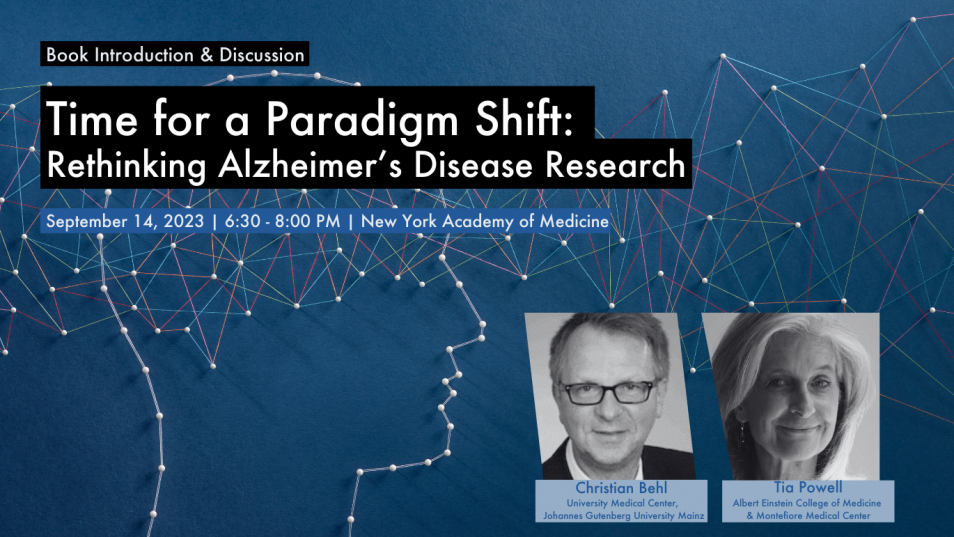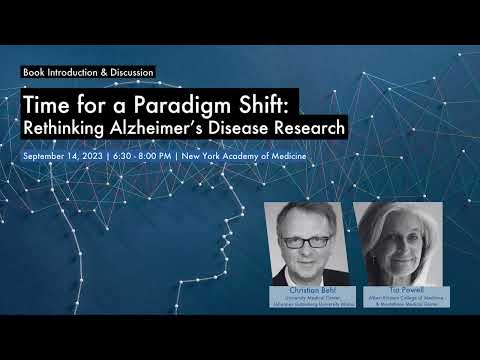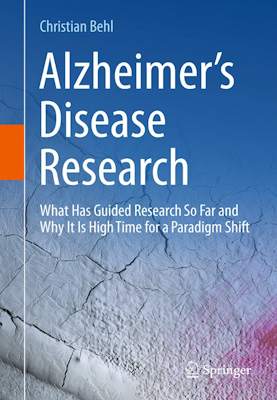Time for a Paradigm Shift: Rethinking Alzheimer’s Disease Research

Join us for a book introduction and discussion on current trends in Alzheimer’s disease research with Christian Behl and Tia Powell.
Have a look at our Photo Gallery on Smugmug.com.
Event Recording

To play the video, click the thumbnail. Once activated data will be transmitted to the respective provider. Watch on YouTube
Event Information
September 14, 2023, 6:30 PM to 8:00 PM
The New York Academy of Medicine (1216 5th Avenue New York, NY 10029)
Organizer(s): DWIH New York
With an estimated 6 million people with Alzheimer’s disease in the U.S. alone1, not to mention affected family and friends, the need to develop a cure for this devastating brain disease is immense. The U.S. Federal Government invests roughly 3.5 billion USD in Alzheimer’s research annually and additionally funds research of Alzheimer’s disease related dementias2. Yet despite recent announcements about possible new treatments with anti-amyloid antibodies that “resulted in moderately less decline on measures of cognition and function,”3 a breakthrough in Alzheimer’s therapy or a cure remains elusive. Currently, the research field is in a lively discussion about the actual relevance of the observed small effects of this new treatment for the individual patient.
 In his latest book, Alzheimer’s Disease Research: What Has Guided Research So Far and Why It Is High Time for a Paradigm Shift, neuroscientist Christian Behl outlines the history of Alzheimer’s research up to the present day and criticizes that for too long research has focused on one particular hypothesis, the so-called “amyloid-cascade-hypothesis,” and has not adequately followed a wider range of promising research paths. From the work of the disease’s namesake Aloysius Alzheimer 100 years ago, to the most recent drug developments and controversies of the last decades, Behl tracks how much of the research has almost exclusively concentrated on the role of amyloid beta peptide, a key component of plaques found in the brain of individuals with Alzheimer’s disease.
In his latest book, Alzheimer’s Disease Research: What Has Guided Research So Far and Why It Is High Time for a Paradigm Shift, neuroscientist Christian Behl outlines the history of Alzheimer’s research up to the present day and criticizes that for too long research has focused on one particular hypothesis, the so-called “amyloid-cascade-hypothesis,” and has not adequately followed a wider range of promising research paths. From the work of the disease’s namesake Aloysius Alzheimer 100 years ago, to the most recent drug developments and controversies of the last decades, Behl tracks how much of the research has almost exclusively concentrated on the role of amyloid beta peptide, a key component of plaques found in the brain of individuals with Alzheimer’s disease.
Behl suggests that it is time to re-evaluate the “amyloid cascade hypothesis” and the actual role of amyloid beta peptide in the disease. He presents a number of alternative disease hypotheses and raises pertinent questions about Alzheimer’s disease research strategies, the funding landscape, and the too narrow focus on one dominating hypothesis.
Prof. Dr. Behl will introduce his book, and then dive into a discussion with Dr. Tia Powell. The discussion will address various topics surrounding Alzheimer’s disease research including the following questions:
- Why are the exact causes of Alzheimer’s disease still in the dark, despite the immense, global research efforts in academia as well as in the pharmaceutical industry?
- Why has the majority of an entire research field kept focusing on a single hypothesis that establishes the deposition of the amyloid beta peptide in the brain as the key trigger of Alzheimer’s pathology, even though this concept has still not been convincingly proven in the clinics?
- Are there other hypotheses that might explain the pathogenesis of this complex brain disease, and if so, why were these perspectives not adequately followed?
Our Experts

Dr. Christian Behl is Professor of Pathobiochemistry and Director of the Institute of Pathobiochemistry at the University Medical Center of the Johannes Gutenberg University Mainz, Germany. He has been closely following Alzheimer’s Disease research since the early 1990’s, when he first got involved into the field himself during his time at the Salk Institute for Biological Studies, La Jolla, USA. He stayed active in the field all through his research station at the Max Planck Institute of Psychiatry, Munich, Germany, and later in Mainz. There his current research (in Mainz) focuses on the cellular degradation mechanism autophagy in the context of neurodegeneration and aging. For quite some time Behl has been an active advocate for widening the focus of Alzheimer’s Disease research to improve the understanding of this complex, age-related brain disorder. Behl is member of several scientific boards, including the German Alzheimer Foundation.Christian Behl, Professor of Pathobiochemistry, University Medical Center of Johannes Gutenberg University Mainz

Tia Powell, MD, holds the Shoshanah Trachtenberg Frackman chair in medical ethics, and is professor of epidemiology and psychiatry at Albert Einstein College of Medicine and Montefiore Medical Center. Dr. Powell focuses on bioethics issues related to public policy, aging, dementia, end-of-life care, and public health disasters. She served 4 years as executive director of the New York State Task Force on Life and the Law, which was New York State’s bioethics commission. Dr. Powell has worked with NASEM on many projects, and in 2021 chaired the report committee for Reducing the Impact of Dementia in America: a Decadal Survey of Behavioral and Social Sciences. She has worked with the CDC, NY State and City, and various professional organizations on issues related to public health ethics and disasters. She served as a special advisor to AHRQ on ethics, dementia and multiple chronic conditions. She is on the American Psychiatric Association ethics committee, and is a Fellow of NYAM and the Hastings Center. She wrote Dementia Reimagined: Building a Life of Joy and Dignity from Beginning to End, published in 2019 by Penguin Random House. Dr. Powell received a B.A. from Harvard College and M.D. from Yale Medical School.Tia Powell, Professor of Epidemiology and Psychiatry, Albert Einstein College of Medicine and Montefiore Medical Center
[1] National Institute on Aging. “Alzheimer’s Disease Fact Sheet.” National Institute on Aging, 5 Apr. 2023, www.nia.nih.gov/health/alzheimers-disease-fact-sheet/.
[2] National Institute of Health. “RePORT.” Report.nih.gov, 24 Feb. 2020, report.nih.gov/funding/categorical-spending#/.
[3] van Dyck CH, Swanson CJ, Aisen P, Bateman RJ, Chen C, Gee M, Kanekiyo M, Li D, Reyderman L, Cohen S, Froelich L, Katayama S, Sabbagh M, Vellas B, Watson D, Dhadda S, Irizarry M, Kramer LD, Iwatsubo T. Lecanemab in Early Alzheimer’s Disease. N Engl J Med. 2023 Jan 5;388(1):9-21. doi: 10.1056/NEJMoa2212948. Epub 2022 Nov 29. PMID: 36449413.

